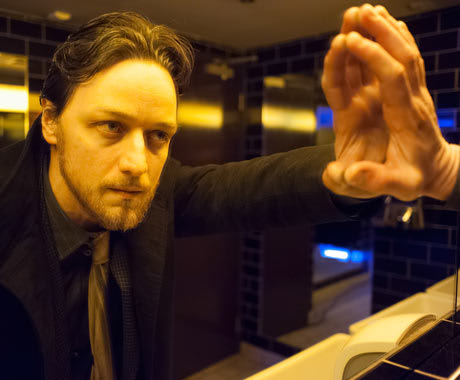Nearly 20 years after Danny Boyle's adaptation of Irvine Welsh's novel Trainspotting helped usurp mid-'90s heroin chic, comparisons are inevitable for the latest Welsh work on screen. Filth, adapted and directed by Jon S. Baird, continues Welsh's fixation on tying together drug-addled excess, hallucinations, guilt, and general despair. The film follows Detective Sargeant Bruce Robertson (James McAvoy), a Bad Lieutenant type who schemes against his fellow detectives, mercilessly bullies his "best friend" (Eddie Marsan), exploits any woman he encounters and consumes a motley assortment of drugs (both prescribed and otherwise). The revealing of Robertson's fractured mental state is tied into solving the murder of a Japanese student, of whom Robertson has intimate knowledge that could break the case, his career and, possibly, his sanity.
The hallucinatory aspects of the character's mental breakdown are compartmentalized into highly stylized psychotherapy sessions. Unfortunately, these are staged too broadly to have the same horrific effect as the wall-climbing baby from Trainspotting. This ham-fisted approach hampers the considerable efforts of a strong supporting cast, including the boundlessly energetic Jim Broadbent as Robertson's hallucinatory psychotherapist. Jamie Bell and Imogen Poots also hold their roles as fellow detectives sparring with Robertson while trying to retain their dignity.
The ambiguous structure of the film does reveal some savvy, as Robertson's mental collapse and the resolution of the murder converge to illuminate the greater crux of the story. As Robertson, James McAvoy holds definition in his face and posture akin to the sinewy look Leonardo DiCaprio developed in The Departed. McAvoy downplays his charisma until it slouches, enhancing his hardened grimace and demonstrating an impressive range (he also plunders the googolplexes this summer in X-Men: Days of Future Past).
Speaking of days of future past, the time displacement between 1998, when the novel was published, and now is also noticeable. Jokes and plot points hinging on washroom graffiti and obscene phone calls do not appear congruent with characters who watch wall-mounted flat screen televisions. This sort of disjointedness interferes with the deliberate disorientation of the character, making the scenes feel unfocused rather than just uneasy. In this respect, navigating through Filth may prove to be too dirty a task for many viewers.
(Magnolia)The hallucinatory aspects of the character's mental breakdown are compartmentalized into highly stylized psychotherapy sessions. Unfortunately, these are staged too broadly to have the same horrific effect as the wall-climbing baby from Trainspotting. This ham-fisted approach hampers the considerable efforts of a strong supporting cast, including the boundlessly energetic Jim Broadbent as Robertson's hallucinatory psychotherapist. Jamie Bell and Imogen Poots also hold their roles as fellow detectives sparring with Robertson while trying to retain their dignity.
The ambiguous structure of the film does reveal some savvy, as Robertson's mental collapse and the resolution of the murder converge to illuminate the greater crux of the story. As Robertson, James McAvoy holds definition in his face and posture akin to the sinewy look Leonardo DiCaprio developed in The Departed. McAvoy downplays his charisma until it slouches, enhancing his hardened grimace and demonstrating an impressive range (he also plunders the googolplexes this summer in X-Men: Days of Future Past).
Speaking of days of future past, the time displacement between 1998, when the novel was published, and now is also noticeable. Jokes and plot points hinging on washroom graffiti and obscene phone calls do not appear congruent with characters who watch wall-mounted flat screen televisions. This sort of disjointedness interferes with the deliberate disorientation of the character, making the scenes feel unfocused rather than just uneasy. In this respect, navigating through Filth may prove to be too dirty a task for many viewers.




